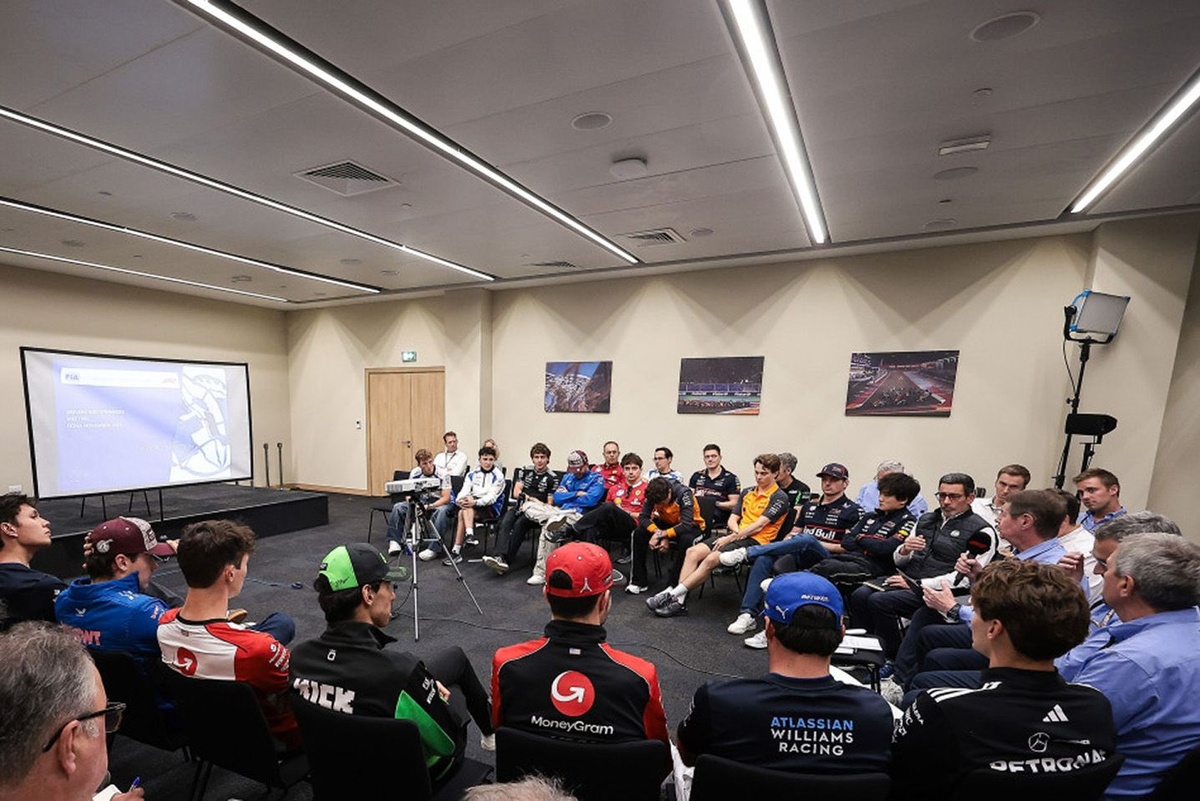Formula 1 News: Drivers push for Driving Guidelines change
(GMM) Formula 1’s highly anticipated GPDA-FIA meeting (pictured) finally took place in Qatar, with drivers again urging the federation to scrap the controversial “driving guidelines” and move toward a system built on permanent, expert stewards.
It follows months of frustration over inconsistent penalties and unpopular interpretations – with many drivers publicly questioning whether the current stewarding panel understands real racing situations.
GPDA director Carlos Sainz didn’t hide his view when asked in Qatar whether F1 even needs the current framework of driving guidelines.
“I’m going to speak as Carlos Sainz, not as GPDA,” he said. “Recently after races I’ve seen some analysis from Karun Chandhok, Jolyon Palmer, Anthony Davidson.
“Every time I see this analysis, they do a very good job. They put the blame correctly most of the time – or call it a racing incident.”
Sainz said that level of understanding is exactly what drivers want from future stewarding.
“My future ideal is no guidelines and people that are able to judge these incidents as well as these three people do,” he said. “I’m quite impressed at the job some of the broadcasters do – the in-depth analysis, the language they speak, the background they have.
“That’s a level of ‘stewardness’, if you want to call it that, that is very high.”
While not criticizing the current stewards directly, he made clear that expert, consistent voices are essential.
“It doesn’t mean the stewards don’t do a good job,” said the Williams driver. “It means what I see after the race from these people is a very high level. Without guidelines, they’d be able to judge each decision correctly – and without bias.”
Sainz said he’s not sure whether guidelines themselves are needed, but insisted drivers overwhelmingly believe experienced ex-racers should be the ones making the calls.
Chandhok, Palmer and Davidson are understood to have been specifically cited to the FIA in Thursday’s meeting as examples of the type of structure the GPDA wants going forward.
FIA Press Release
The FIA hosted its third annual review meeting with the Formula 1 Stewards’ Chairs and F1 drivers on Thursday 27 November, during the Qatar Grand Prix. The meeting was also attended by the three Driver Stewards appointed for the 2026 season.
These annual meetings provide an open forum for drivers and stewards to discuss driving standards and penalty guidelines, share perspectives, and ensure that regulations are applied clearly and consistently. They also allow the FIA to gather feedback and review guidance where appropriate.
A central focus of the discussion was the Driving Standards Guidelines (DSGs), first introduced in 2022 at the request of the drivers to clarify what is and is not permitted when overtaking or defending on track. The DSGs are intended to be a living document, have been updated twice since their introduction, and are publicly available to improve transparency and help newer fans better understand stewarding decisions. The current F1-specific version has been reviewed and agreed with the GPDA.
The stewards reiterated that the DSGs are guidelines, not regulations. They explain how the rules are interpreted in practice, with the aim of ensuring a level playing field and consistent decision-making. Data from the past three seasons shows that the DSGs have contributed to greater consistency in stewarding decisions, supported by detailed analysis provided by teams.
After 22 races and five Sprints this season — involving dozens of racing incidents — the discussion focused primarily on a small number of case studies, which formed the basis of most of the debate. These included:
- Piastri–Antonelli (Interlagos): overtaking on the inside
- Sainz–Bearman (Monza): overtaking on the outside
- Sainz–Lawson (Zandvoort): application of the DSGs in long-radius corners
- Norris–Leclerc (Austin): track limits and what should or should not count as a strike
- Verstappen–Leclerc (Mexico City): leaving the track and gaining a lasting advantage
Key takeaways and general preferences expressed by the drivers covered several areas, including:
- A stronger emphasis on respect for yellow flags, and discussion of potential additional concepts to further enhance safety
- A clear preference for hearings to be held after the race when stewards believe not all relevant elements may be available during live running
- A shared view that guidelines cannot cover every scenario, underlining the importance of having an experienced Driver Steward on each panel
- Blue flags, including potential additions to the DSGs to clarify expected behaviour from lapped cars
The FIA and the Formula 1 Stewards would like to thank the drivers and teams for their constructive input. The discussion was frank, open and conducted in a very collegial atmosphere, which was greatly appreciated by the stewards. The points raised will inform any future refinements to the DSGs, in consultation with the GPDA and the FIA Drivers’ Commission. No changes will be made for the final two Grands Prix of the 2025 season.
